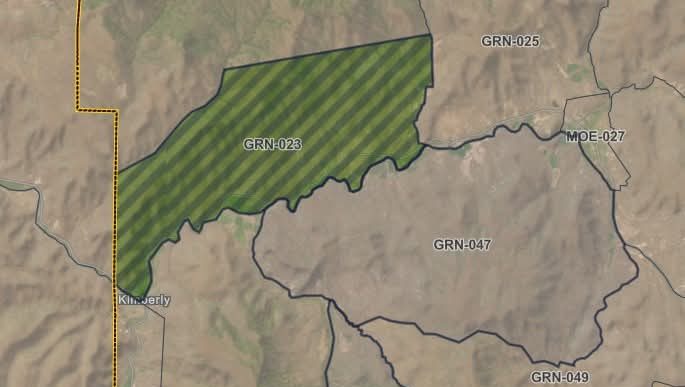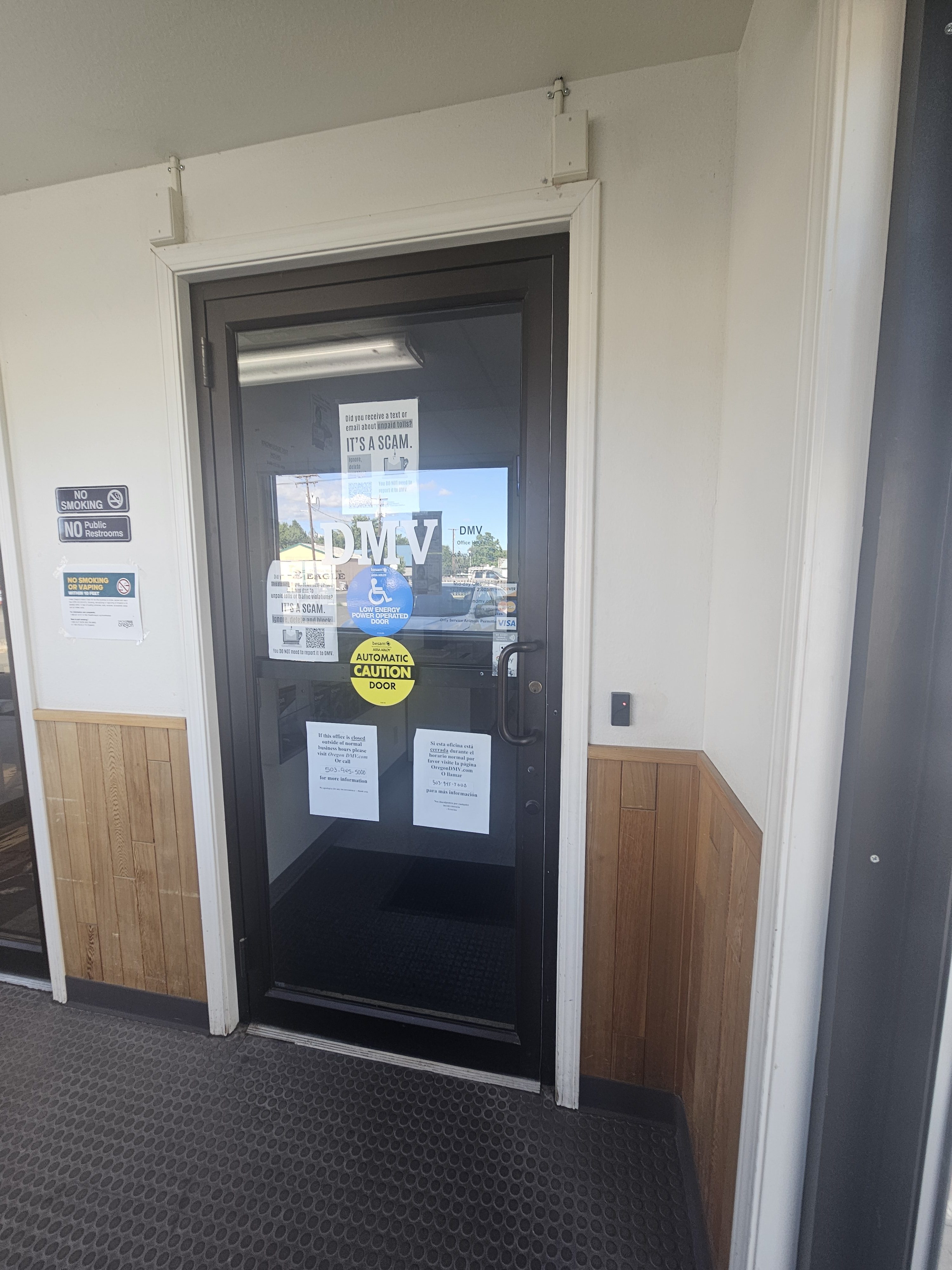Greater Idaho prompts lively, civil conversation
Published 12:00 am Wednesday, August 30, 2023

- Paul Doherty of the Wallowa City Council tells how he believes most Northeast Oregonians just want Salem to pay heed to their voices, Wednesday, Aug. 23, 2023, during the Wallowa County Board of Commissioners' first Greater Idaho meeting.
ENTERPRISE — It was a civil discussion — not civil war — that took place Wednesday, Aug. 23, when Wallowa County residents gathered for the first discussion with the county commissioners about possibly moving the state’s border to make the county part of Idaho.
Trending
Many of the participants said the issue was more that they feel misrepresented in Salem and less that they want to become Idahoans.
More than 50 people took part — about 20 in the courthouse’s Thornton Conference Room and another 30 via Zoom — to discuss the question.
A county ballot measure in the May 2023 election mandating that the commissioners meet twice each year to discuss the issue passed with just seven votes to spare out of nearly 3,500 votes cast. The next meeting will be in February. Wallowa County voted a similar measure down, also by a slim margin, in 2020.
Trending
In opening the special meeting, commission Chairman John Hillock said the purpose of the meeting was, as required by the ballot measure, to “discuss the interests of Wallowa County in relocating the state borders and to prepare county to become part of Idaho.” (The ballot measure does not actually name Idaho, but it’s assumed that’s the state Wallowa County would join.)
Speakers were limited to two minutes. The meeting was scheduled to end after 90 minutes, but it came in under that mark: The meeting broke up after about 70 minutes.
Commissioners’ views
Hillock first took comments from his fellow commissioners, saying he and the others are taking a neutral position.
Commissioner Susan Roberts said she’s studied the matter.
“I’ve looked at land use, licensing, education, what the differences are between what Idaho has and what we have here in Oregon and how that change would make a difference to those sorts of things,” she said. “There were a myriad of other things, but to me the big one was land use and the difference in the rules in Idaho and the rules in Oregon.”
Roberts said she also looked at how the border change would happen. At the least, it requires approval of both state legislatures and Congress. “I’m pretty sure I’ll be long gone before that ever happens,” she said. “It’s just a really long path to get to that.”
Commissioner Todd Nash also took a practical approach, suggesting a whiteboard listing “things that are favorable to Wallowa County and the things that would have negative impacts, so if we really had a clear vision of what it looked like should we actually move,” he said.
He said he’s also discussed the issue with members of the public.
“A lot of them are proponents of trying to get a stronger voice on the other side of the state,” Nash said. “They’re frustrated, but they love Oregon, they love what this great state is, but there’s a frustration level and they want to send that message to Salem rather than to actually move. I think vetting those things out in the future in preparation for the next meeting, some of that could be done.”
Public comment
In their comments, attendees at the meeting mostly followed the practical approach the commissioners took.
Carrie Silveira wondered if county voters would get a chance to vote on whether they actually want to move the county to Idaho, if the process gets to that point. She noted that the ballot measure calls only for discussions of the possibility.
Hillock and Roberts agreed that another vote likely would be part of the process. Hillock noted that any county voter could work to put another Greater Idaho measure on the ballot, possibly even a measure to eliminate the requirement for the twice-yearly commission discussions.
Paul Doherty, who serves on the Wallowa City Council, agreed that moving the border would be a long, involved process. He agreed with Nash’s assessment that Eastern Oregonians just want Salem to hear and respond to them.
“I’m not sure most of the people voted (on the ballot measure) just because they want to be in Idaho,” he said. “I think it’s more the fact that we feel completely misrepresented in Salem.”
Longtime Crow Creek rancher Mack Birkmaier agreed and called the state government “dysfunctional.”
“The cities in Oregon have now proved that,” he said. “Those people down there are controlling us and they’ve got rid of their police protection, they made them stand there and humiliate themselves during all those riots,” referring to the 2020 riots in Portland. “They can’t run a city down there; they’ve destroyed a good city and I don’t care to be governed by those people.”
He also spoke of the poor reception rural Eastern Oregon gets from Democrats as opposed to Republicans.
“The disrespect I got when I was president of the Oregon Cattlemen’s Association was horrendous,” he said. “We would try to get some meetings lined up so we could get our say and with those people down there, the arrogance and the intimidation they showed me, they wouldn’t even meet with us.”
At the time of the 1995-96 wolf reintroductions in the Rockies, Birkmaier was the OCA president. Later he served on the association’s wolf committee. Nash, the current OCA president, and Birkmaier’s son, Tom, unsuccessfully went to bat in the Legislature during the most recent session to get a wolf compensation bill passed.
“It seems like the environmentalists are driving the agenda down there,” Mack Birkmaier said. “We’re a resource county here; cattle is still the No. 1 in what we produce here in Wallowa County. … But they dump every predator on us that they can.”
Karen Wurdingen also is tired of not being represented.
“We lived on the west side, we farmed on the west side and we came back over here. I’m tired of moving,” she said. “We need something done. Is this a high mountain? Yes it is. But I’m willing to try. We’ve got to do something. … Something’s got to change here. I love Oregon and so does my husband, but we at least have to give it a shot.”
Wages and taxes
The issues of wages and taxes also were brought up. One man said Idaho’s minimum wage is just $7 an hour (it’s been set at the federal minimum wage of $7.25 an hour since 2009) and he said that’s not enough to live on. Oregon’s minimum wage for rural counties is $13.20 an hour.
According to taxfoundation.org, Idaho has a flat 5.8% individual income tax. Idaho also has a 5.8% corporate income tax rate. Idaho has a 6% state sales tax rate, a 3% maximum local sales tax rate, and an average combined state and local sales tax rate of 6.02%.
Oregon has a graduated individual income tax, with rates ranging from 4.75% to 9.9%. There are also jurisdictions that collect local income taxes. Oregon has a 6.6% to 7.6% corporate income tax rate and levies a gross receipts tax.
According to www.mylifeelsewhere.com/cost-of-living, the cost of living in Oregon is 12.5% more expensive than Idaho.
“Most important to me is property tax,” the man said. “In Wallowa County, we have an assessed value every year; it can go up 3% of what it’s assessed. Right now it’s roughly 50% of what the real property value is. It can go up 3% — that means it doubles in 25 years. It’s planned that way and it’s part of that liberal west-side plan that’s a good thing for the average person.
“In Idaho, it’s real market value. The average person’s taxes on their home in Wallowa County would nearly double the first year and it could double again the next year. It’s shortsighted. This could be a really great thing if we did this — for the Boise treasury. Nobody else benefits. Ranchers would lose, everybody would lose if we did this. If you want to go over there, U-Haul has really good deals.”
Other participants raised a variety of other issues, including the impact realigning the border would have on health care in Wallowa County, the effect of the move on the county’s housing crunch and whether Idaho offers marginalized populations such as LGBTQ+ people the same level of legal protection as does Oregon.
Others attending
In addition to Wallowa County residents, several were present — primarily on Zoom — from around the state and region. Matt McCaw and Mike McCarter of the Greater Idaho Movement were available to answer questions.
Democratic state Sen. Michael Denbrow from Portland also attended the session via Zoom. Dembrow said he was attending primarily to listen, but added: “I think it’s incumbent on us legislators to make sure that everybody has a voice, and everybody’s listened to.”
“I understand that Wallowa County is very divided on this issue,” he said. “And it’s really important that this kind of dialogue happens.”
The commissioners agreed, and emphasized that they wanted more input from the public.
Roberts recommended producing a list of things those attending want the commissioners to promote in Salem.
“I think it would be a wonderful idea to get an informal committee together to work on some of those things,” Nash said.
Hillock agreed.
“Visit with some of your neighbors and work on that,” he said. “Again, our responsibility is the question on the ballot … that’s our responsibility. In order to do that, we need input from you guys. You’re the ones living in the county; we represent you and that’s why I take a neutral position on this because I want the people to make the decision.”
Mack Birkmaier spoke for many when he expressed his thanks to the commissioners.
“We appreciate you guys, every damned one of you,” he said.
The original version of this story misstated the year in which Wallowa County voters approved a ballot measure calling for the county commissioners to discuss the Move Oregon’s Border movement as it pertains to the county. The measure passed in 2023. The story has been corrected.









